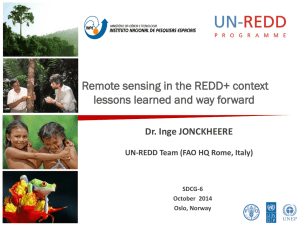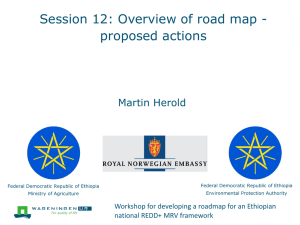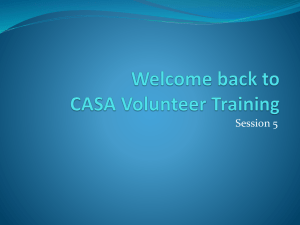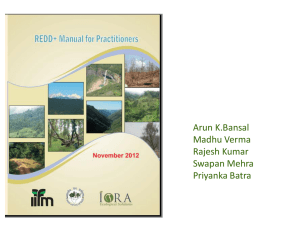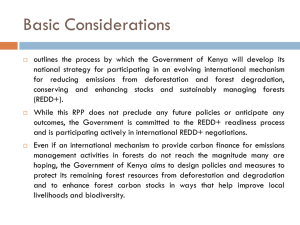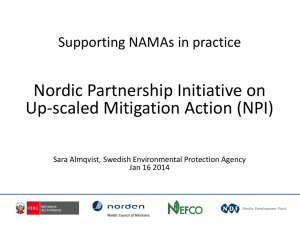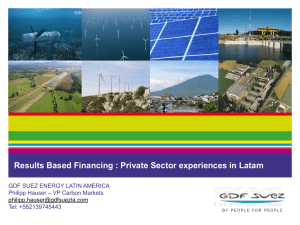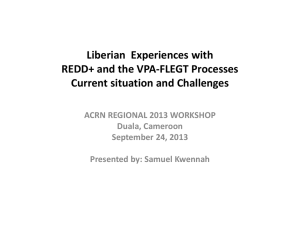Session 9
advertisement
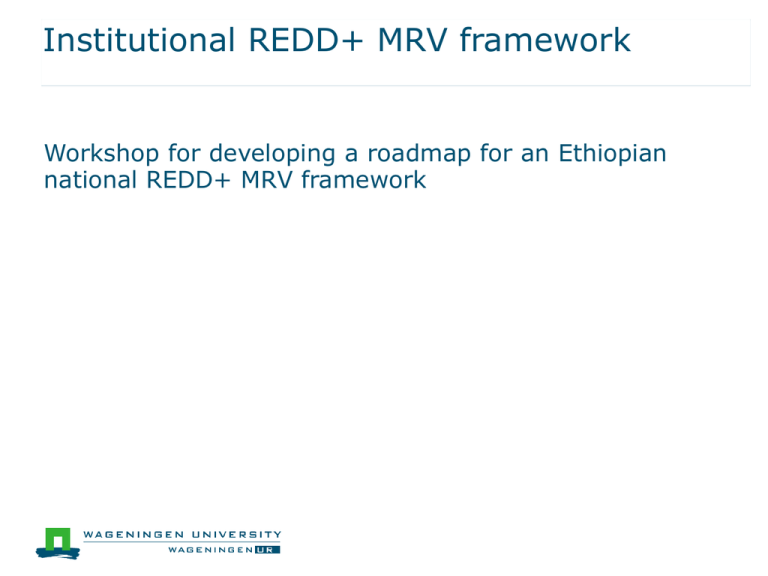
Institutional REDD+ MRV framework Workshop for developing a roadmap for an Ethiopian national REDD+ MRV framework Institutional framework A strong institutional set up and the establishment and maintenance of partnership and cooperation on all levels as enabling framework Coordination and integration of national datasets through a high-level national technical committee accompanied and development of a national data management system and infrastructure Sustain internal and national communication mechanisms A framework for involving all relevant national stakeholders involved in MRV and REDD implementation and mechanisms to ensure transparent and open exchange and management of data streams Need for engagement with local and international community Clarity on roles and responsibilities Institutional framework REDD+ MRV: components MRV coordination / links to REDD+ policy/implementation National data management infrastructure NFM/MRV monitoring – remote sensing NFM/MRV monitoring – forest inventories NFM/MRV analysis and estimation REDD+ international reporting (IPCC) NFM/MRV local-national interaction NFM/MRV training – capacity building NFM/MRV research – continuous improvements Define roles and responsibilities! REDD+ MRV coordination component A high-level national coordination and cooperation REDD+ MRV unit could: ● Link forest carbon MRV system to the national policy for REDD+ ● Specify and oversee roles, responsibilities and cobenefits, and other monitoring efforts ● Coordinate national datasets, national data infrastructure ● Engage local level and integrate local data streams (quality control, consistency) ● Coordinate MRV components ● National REDD+ reporting Relevant organisations for MRV ( ... R-PP) Organisation Full name Task MRV expertise REPAs Regional environmental protection agencies capacity need assessment has to be conducted BoARD Bureaux of Agriculture and Rural Development Ministry of Mines and Energy Sub-national or regional level monitoring reporting, verification of sustainable forest management and compliance with and enforcement of policies, strategies and regulations Sustainable forest management Sustainable energy supply Involved in the first phase of WBISPP project, specifically in the energy component. Expertise on land cover (forests) within river basins REDD coordinator MRV unit with medium level (as defined in this document) GIS and Remote Sensing experience MoME MoWR Land Administration Unit Ministry of Water Resources Ministry of Agriculture River basin management FEPA Environmental Protection Authority National data integration for IPCC estimation National GHG inventory, National and reporting communcation, international reporting EMA Ethiopian Mapping Agency EWCA Ethiopian Wildlife Conservation Authority Main mapping centre using GIS and Remote Sensing in Ethiopia Main topographic mapping centre Management of national parks & wildlife sanctuaries MoA Formulation, compliance support, monitoring, reporting, verification of sustainable forest management and related national policies, strategies and regulations. Medium level (as defined in this document) GIS and Remote Sensing expertise No GIS and Remote Sensing Expertise Relevant organisations for MRV (R-PP) Organisation Full name Task MRV expertise CSA Central Statistics Authority National statistics centre FRC - EARI Forestry Research Centre Ethiopian Agricultural Research Institute Institute of Biodiversity Conservation Main expertise centre on forest research Remote Sensing experience on census unit area mapping Forest inventories MU Mekelle University WGCF Wondo Genet College of Forestry Horn of Africa Regional Environment Center Institute of Sustainable Development , Farm-Africa/ SOS Sahel Ethiopia Frankfurt Zoological Society Dryland agriculture and biodiversity Forestry research IBC HoAREC ISD, FarmAfrica/ SOS Sahel Ethiopia FZS CSO at each Varies Woreda NGO supporting Varies each Woreda, if found Main expertise centre on biodiversity Promote agroforestry Rehabilitation of degraded areas Bale Mountains Eco Region Sustainable Management Project (ERSMP) Bale Mountains National Park (BMNP) project Varies Varies Inventories and conservation of plant, animal and microbial biodiversity Woody biomass inventories Expertise in forest inventory Land cover mapping Includes land cover mapping, forest inventories and carbon accounting studies Includes land cover mapping, forest inventories and carbon accounting studies Unlikely to have any, will have to be trained Unlikely to have any, will have to be trained Involving the local level 1. REDD+ is a national process (policy and performance) but needs to work on the local level 2. In many countries, national level REDD+ implementation & monitoring benefits from direct engagement of local actors and community 3. For Ethiopia: 4. ● Participatory forest monitoring framework ● Several local REDD+ related studies (data, experiences, capacities) ● Need for demonstration activities Develop local >< national integration as win-win situation Community-based monitoring Local experts / communities can provide important data streams: ● Signalling forest change and human activity ● Forest inventory measurements ● Revisit time and long-term monitoring ● As independent data sources Issues of Community-based monitoring Importance varies depending on national priorities Data issues: ● Spatially constraint (local!) ● Data quality ● Data credibility ● Data consistency ● Requires validation and quality control Need to develop synergy among national and community based monitoring International reporting Nationallevel MRV • • • • • • National priorities and strategies for local REDD+ implementation National datasets and streams for local use Capacity development and revenue stream (for MRV) MRV guidance & standards National data infrastructure and quality control of local measurements Monitoring of leakage • • • • Local & communitybased monitoring REDD+ participation and safeguards Local data collection as input to national monitoring (forest inventory, regular and nearreal time tracking of forest change events) Performance reporting (longterm) for local implementation activities Independent data sources for validation purposes Higher education and research institutes NFM/MRV is in hand of mandated governmental institutions Organizations, universities and research centers Conduct/support research on key issues to fill data and knowledge gaps Main driver for continuous improvement in NFM/MRV Long-term role in capacity building and training Framework for participation, scientific advice and (inter)national partnering (e.g. through technical and scientific advisory group) Session 10: Breakout groups Institutions and stakeholders 1. National institutional framework for REDD+ MRV 2. Strategies for community and local participation 3. Involvement of higher education and research institutes 1. Institutional framework MRV Objective: develop institutional framework for MRV and steps to achieve this. With specific focus on: Clarify roles and responsibilities for different REDD+ MRV components REDD+ MRV coordination and cooperation mechanism National data management system and infrastructure Involvement of relevant stakeholders in MRV and REDD implementation, with consideration of multi-sector (drivers!) partnerships and engagement with local and international community 2. Strategies for community participation Objective: explore how, when and where to involve local experts/expertise in NFM/MRV activities: discuss the role, opportunities mechanisms of local actors in REDD and MRV and defined capacity development needs and next steps 3. Involvement of higher education and research institutes Objective: discuss how to involve and support research org. on key issues, and how to build long-term partnerships/research priorities with research/training organizations: ● Define role of higher education and research institutions in REDD+ monitoring, capacity building and continuous improvements ● Thematic foci and areas of engagements ● Identify relevant organizations and research partners ● Outline priorities and next steps to take Session 10: Breakout groups Institutions and stakeholders 1. National institutional framework for REDD+ MRV 2. Strategies for community and local participation 3. Involvement of higher education and research institutes
